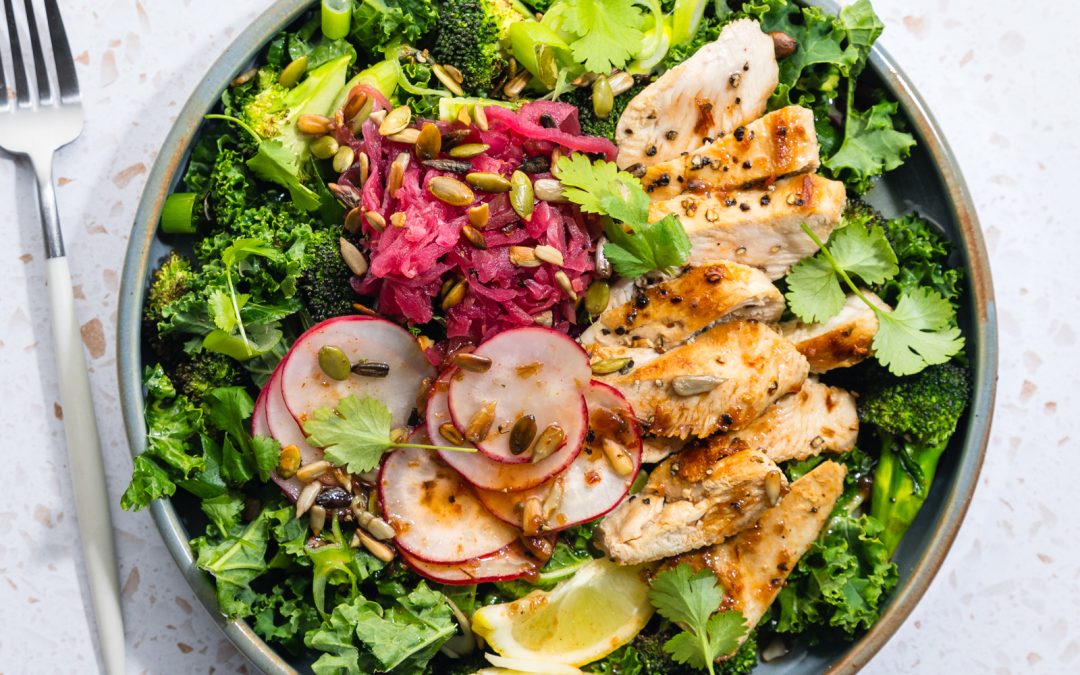
Fresh Start ethos, portion size and moderation
The Fresh Start Programme is all about achieving a higher level of health and well-being. With all the confusing and often contradictory diet and weight loss information available, even figuring out where to begin can be a road block. Our goal at Fresh Start is to keep us moving forward with our health goals, with nutritionally balanced, perfectly portioned dinners, because it’s not about what we can’t have, but what we can nourish ourselves with. We’re Nude Food champions, meaning we aim to eat real foods, as close to their natural state — think veggies, fruit and whole grains. We’re also big advocates for enjoying goodness in moderation, be it a small slice of carrot cake and a coffee with friends, or a glass of bubbly to celebrate a special occasion. It’s important to nourish both our body and our mind, whilst being mindful of portion size and frequency of ‘treat-like’ items.
Sugar
When trying to lose weight, limiting your intake of refined sugar is going to make a big difference. Refined sugars are empty calories that provide you little to no nutritional value or feeling of fullness. Nadia’s philosophy on sugar is that a little bit is fine, but preferably from most naturally occurring sources like fruit and dairy, as these sources come with fibre, vitamins and minerals too. Unfortunately, refined sugar is one of the most common food ingredients in packaged food items, and can be found in salad dressings and premade soups or pasta sauces through to yoghurts, cereals and even canned products such as canned beetroot.
One way to check for this is in the ingredient list of the product you’re buying as these are listed in order of volume amount, so if sugar is higher up on the list, the ratio of sugar in that product is likely higher. Aim for an item with less than 10g of sugar per 100g which you can find in the nutrition information table. Sugar can also be listed under a few different names, key ones to look out for are high fructose corn syrup, glucose, sucrose (or anything ending with ‘-ose’), brown rice syrup and molasses.
Preparation
Eating healthy isn’t always the easiest option — lunch stores, cafes and even convenience stores tend to be overflowing with items high in refined sugar, carbs and saturated fat, with little to no veggies. When lunch is a rush and we’re not at home to be able to whip up a veggie and protein packed dish, having a healthy, packed lunch is not only convenient (for lack of a kitchen), but also great for our bank accounts and our waistlines. The key is thinking ahead and doing a little preparation. This doesn’t mean an afternoon has to be spent slaving away in the kitchen for the week ahead, it can be as simple as cooking a little extra dinner and popping it in a container for lunch the next day. . It won’t take you any more time on the night, but will save you plenty the next day.
The next step is to think big picture, for the week ahead. Take some time on a Sunday to look at your calendar and work out which days you’ll need to pack lunch, snacks or even breakfast for. If you’ll be needing a lunch every day, why not throw a tray of roasting veg in the oven to add to salads across the week.
Alcohol
If you drink alcohol and are trying to lose weight or decrease your body fat percentage, you might want to consider reducing your intake or avoiding alcohol altogether. In addition to contributing nutrient devoid, high calories and possibly interfering with your healthy eating plans, alcohol interferes with sleep and normal metabolic pathways including fat burn, which can lead to fat accumulation in your body.
Because it is metabolised by the liver, alcohol also impedes the many other important functions the liver has to do such as breaking down glycogen into glucose for energy and detoxifying substances. Your body cannot store alcohol, so it must metabolize it right away, making it a priority over all other metabolic processes. This can be an issue for fat loss especially if you drink every day, as your body won’t have time to burn stored fat.
Pick occasions that are ‘worth it’, rather than drinking because others are, and choose your drinks wisely. A great option is a nip of spirits with soda water and a slice of fresh lemon, a lower carbohydrate, lower calorie light beer or dry wine.
Exercise
Exercise is any planned and repetitive activity or physical exertion completed in order to achieve or maintain a higher level of fitness and health. This can be walking, swimming, tennis, dancing or a number of other activities. There are countless reasons why we should exercise other than for weight loss purposes, however physical activity certainly promotes that too!
Putting our body into a state of physical exertion helps create changes or adaptations, to ensure next time we do that exercise, our body is well equipped to cope with the higher level of physical stress. During exercise, our body is also using additional energy (calories) to fuel our extra movement, and skeletal muscles are strengthened and toned. Beyond this, circulation is improved, respiratory and cardiac muscles are strengthened and our body’s functional ability improves. Exercise has also been shown to improve sleep quality and mental health.
Click here to return to Fresh Start Blog


